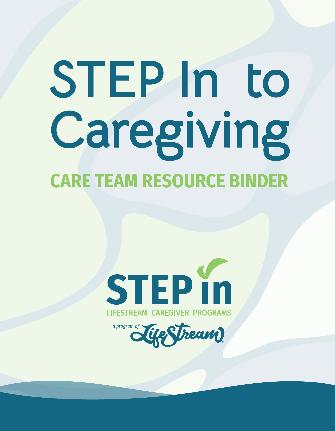




An update from Tia Drumm & Chelsey Krofta, Caregiver Programs Coordinators
Caregiving is a noble and fulfilling role, but it also comes with its unique set of challenges and stresses. In the midst of caring for others, caregivers often forget to care for themselves. However, mindfulness offers a powerful tool for caregivers to find balance and inner peace amidst demands of their role. In this article and newsletter, we hope you will dive into transformative practices of mindfulness and self-care, and find support through words and programs available to you.
The Essence of Mindfulness: Introducing mindfulness as the practice of being fully present in the moment with an open mind and non-judgmental awareness of one’s thoughts, feelings, and sensations.
The Power of Breath: Exploring the role of mindful breathing as an anchor for caregivers, helping to ground in the present moment, and find calm amidst emotions. See page 3 for further support and resources available to you.
Self-Compassion and Self-Care: Emphasizing the practice of self-compassion as an essential aspect of mindfulness, and to treat yourself with kindness and prioritize your own well-being. See page 5 for a few more self-care tips.
Mindfulness is not a destination but a lifelong journey of self-discovery and growth. In the sacred space of caregiving, mindfulness becomes a guiding light, illuminating the path toward inner peace and well-being. By embracing mindfulness as a daily practice, caregivers can cultivate resilience, compassion, and presence, transforming their caregiving journey into a path of profound growth and self-discovery.
For Blackford, Delaware, Grant, Henry, Jay, and Madison counties, contact Tia Drumm at (765) 759-1121 ext. 101 or tdrumm@lifestreaminc.org.
For Fayette, Franklin, Rush, Union, and Wayne counties, contact Chelsey Krofta at (765) 759-1121 ext. 281 or ckrofta@lifestreaminc.org.
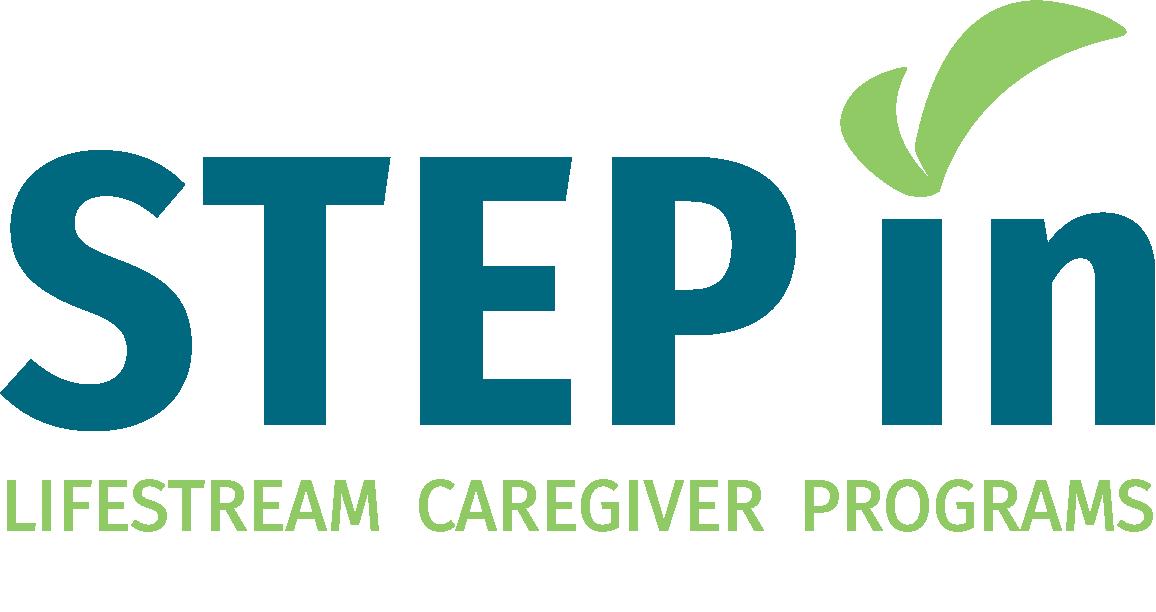

Anupdate from Melissa Roseborough, Care Coach
Dementia—a term encompassing a range of cognitive impairments impacting memory, thinking, and behavior—poses significant challenges for individuals and their loved ones. In navigating this complex condition, the “4 Rs” approach presents a valuable framework for understanding and addressing the needs of those living with dementia.
Recognize: Acknowledge the signs and symptoms of dementia. While memory loss is a common indicator, dementia manifests in various ways, including difficulties with communication, reasoning, and performing daily tasks. Recognizing these changes early allows for timely intervention and support, enhancing the quality of life for individuals with dementia and their caregivers.
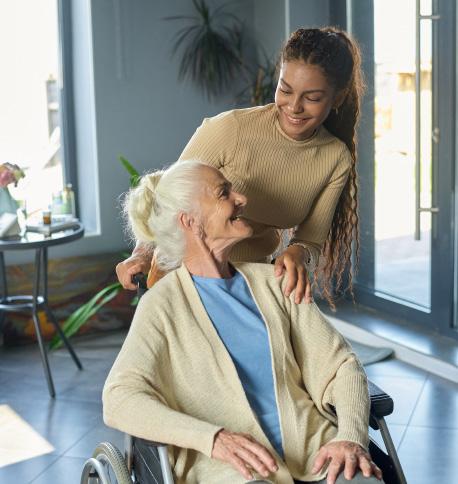
Respond: This step involves developing a comprehensive care plan tailored to the individual’s needs. Every person with dementia is unique, and their care should be personalized to address their specific challenges and goals. Caregivers, including family, friends, and professional providers, must collaborate to create a supportive environment.
Respect: Respect lies at the heart of dementia care, recognizing the inherent dignity and humanity of each person regardless of their cognitive abilities. Individuals with dementia may experience feelings of frustration, confusion, and loss of autonomy, underscoring the importance of maintaining their sense of self-worth and agency.
Reassess: Dementia is a progressive condition, meaning that care needs to evolve over time. Regular reassessment is essential to ensure that care plans remain effective and responsive to everchanging needs and circumstances. Reassessment involves ongoing communication between caregivers, healthcare professionals, and the individual with dementia, allowing for adjustments and refinements as needed.
Thanks to Indiana House Bill 1422, LifeStream Services has expanded our team to include Dementia Outreach Specialists in both of our areas, providing dementia resources and education across our 12-county footprint.
House Bill 1422 provides that an area agency on aging, such as LifeStream, may establish a dementia care specialist program and allows an area agency to designate at least one individual as a dementia care specialist to administer the program.
These dementia specialists recently joined the LifeStream team, and they will help expand valuable information and resources in the communities we serve.
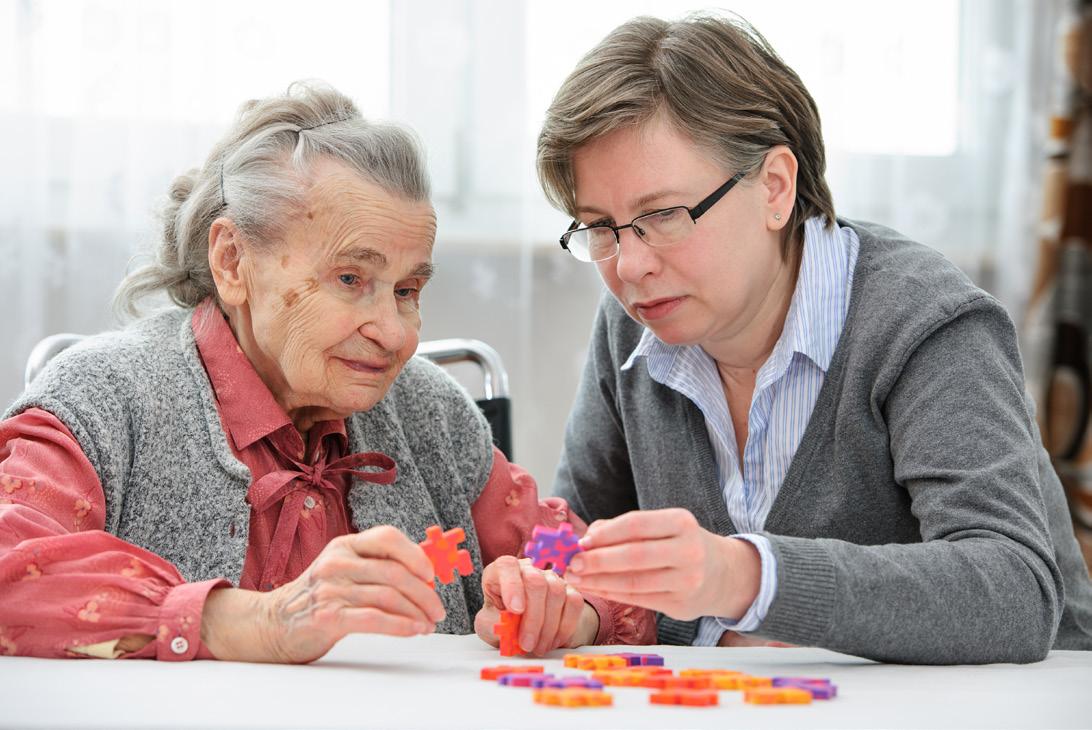
Visit lifestreaminc.org/stepin for Memory Kits and Dementia Caregiver Support Groups

An update from Tia Drumm, Caregiver Programs Coordinator
The Power of Breath: Sit or lay in a comfortable position while you softbelly breathe. Once comfortable, start taking deep breaths in through the nose for five seconds and out through the mouth for five seconds. Release your jaw and abdomen muscles. When inhaling breath, expand the ribcage and stomach—when exhaling, push the abdomen back in. This allows your nervous system to calm and will help you feel relaxed. The goal is to be mindful of your breaths—notice how it feels to inhale and exhale, and try to keep your mind blank. This is not going to be a perfect practice at first, but it will get easier with practice!
You can find some great mindfulness exercises in video, audio, or blog form at The Center for Mind-Body Medicine at cmbm.org located in the Mind-Body Resources tab. Another great website for education on breathing and other self-care topics is mindful.org
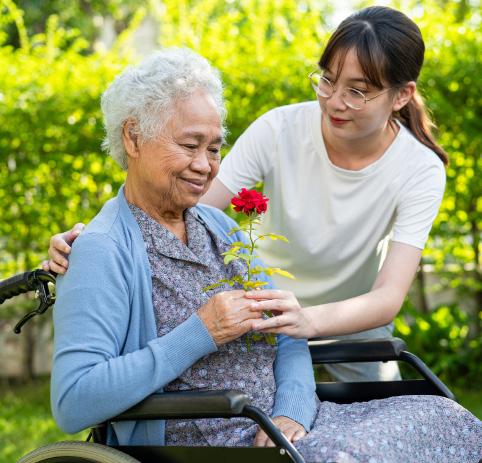
If you are looking for more support or wanting a group to relate to, check out the upcoming events below to learn more about programs and events in your area, or visit lifestreaminc.org/stepin.
This 6-week workshop helps caregivers prioritize their well-being and take care of themselves while caring for a friend or a loved one. Contact your area’s Caregiver Programs Coordinator for more details or to register!
• June 3–July 8, every Monday, 10:30am–12pm
• Online
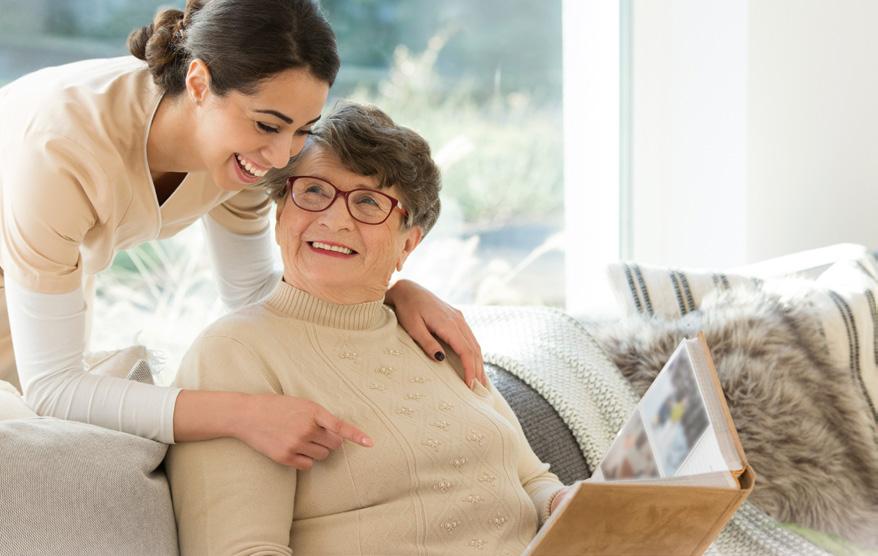
Visit lifestreaminc.org/calendar for a complete
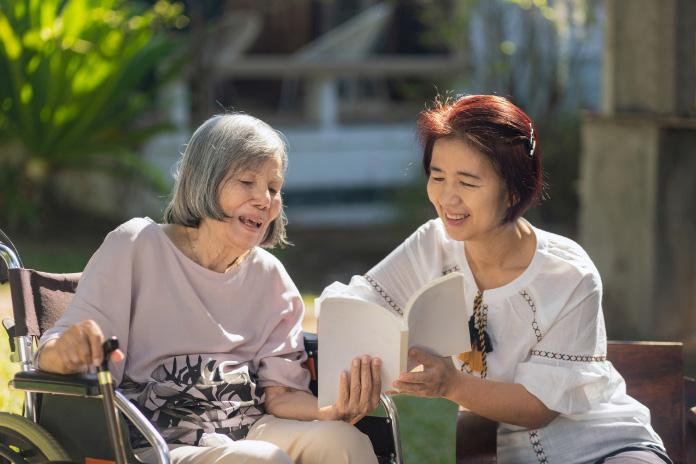
Memory Cafés are a welcoming, safe space for people living with dementia and their caregivers to enjoy social engagement and a break from their normal routine.
Rushville:
• Second Thursday of the month, 10–11am
• Rush County Senior Citizens Center 504 W. 3rd St., Rushville, IN Muncie:
• Second Friday of the month, 11:30am–1pm
• Ball State’s Healthy Lifestyle Building 1615 W. Riverside Ave., Muncie, IN

Caring for a loved one with dementia can be tough. Remember to take time for yourself—be sure that you are giving yourself adequate care and asking for the support and resources you need. Caring for yourself is just as important as caring for your loved one, and in turn, it will allow you to better care for them. Here are a few tips to help you care for your loved one while trying to keep them engaged and as independent as possible as their condition progresses.
• Try to keep a routine, such as bathing, dressing, and eating at the same time each day.
• Help the person write down to-do lists, appointments, and events in a notebook or calendar.
• Plan activities that the person enjoys and try to do them at the same time each day.
• Consider a reminder system for helping those who need to take medications regularly.
• When dressing or bathing, allow the person to do as much as possible for themselves.
• Buy loose-fitting, comfortable, easy-to-use clothing, such as clothes with elastic waistbands, fabric fasteners, or large zipper pulls instead of shoelaces, buttons, or buckles.
• Use a sturdy shower chair to support a person who is unsteady to prevent falls. You can buy shower chairs at drug stores and medical supply stores.
• Be gentle and respectful. Tell the person what you are going to do step by step while you help them bathe or get dressed.
• Serve meals in a consistent, familiar place and give the person enough time to eat.
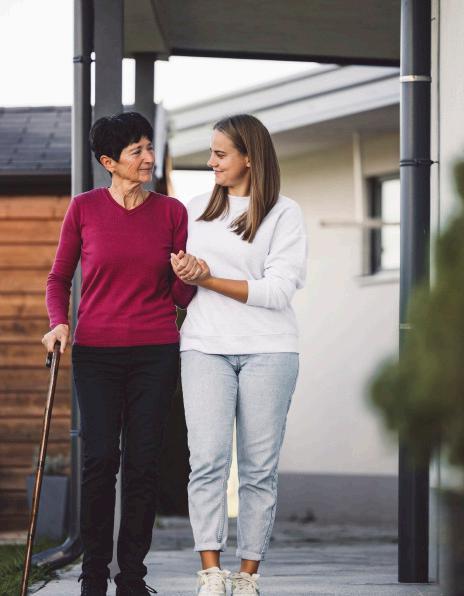

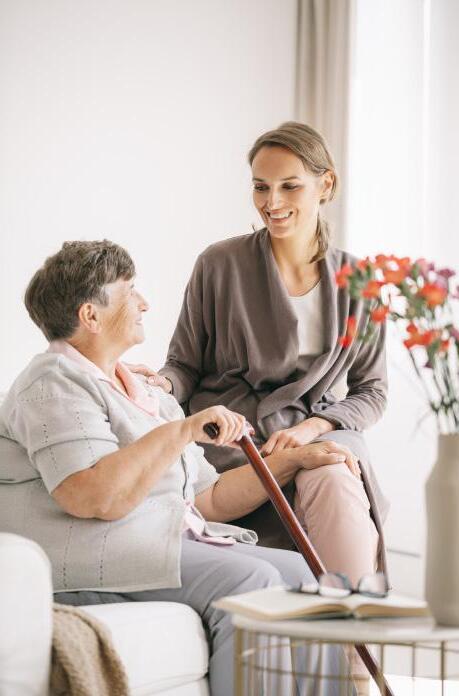


In the hustle and bustle of our daily lives, it is easy to neglect the one person who also needs care—ourselves. The oxygen mask metaphor says to put yourself first. Flight attendants instruct passengers to secure their own mask before assisting others; self-care emphasizes the importance of prioritizing your own needs, too. Below are a few self-care tips for caregivers:
• Prioritize Your Well-Being: Remember, you can’t pour from an empty cup. Make self-care nonnegotiable in your daily routine.
• Stay Connected: Maintain a support network of friends, family, or other caregivers who understand your challenges and can offer support or encouragement. Consider joining a support group or attending one of LifeStream’s monthly Caregiver Gatherings.

• Set Boundaries: Establish clear boundaries to protect your time and energy. Learn to delegate tasks when possible.
• Practice Self-Compassion: Be kind to yourself as you would to others. Recognize that caregiving can be a challenge but also remember to celebrate your victories.
• Find Healthy Outlets: Express your emotions through creative outlets like journaling, art, or music. Talking to a professional or trusted friend can also provide great emotional support.
Taking care of yourself isn’t selfish—it is essential for your well-being and your ability to provide quality care. Other self-care tips could include adequate sleep, eating well, staying active, and more.
For more information about caregiver support programs, events, and other resources, visit lifestreaminc.org/stepin.


Volunteers from the community have been busy creating fidget boards and throw blankets for others to enjoy! Finding comfort in fidget activity boards and blankets can aid in relaxation, stress reduction, and memory. Focus and creativity can both be enhanced by these activities.
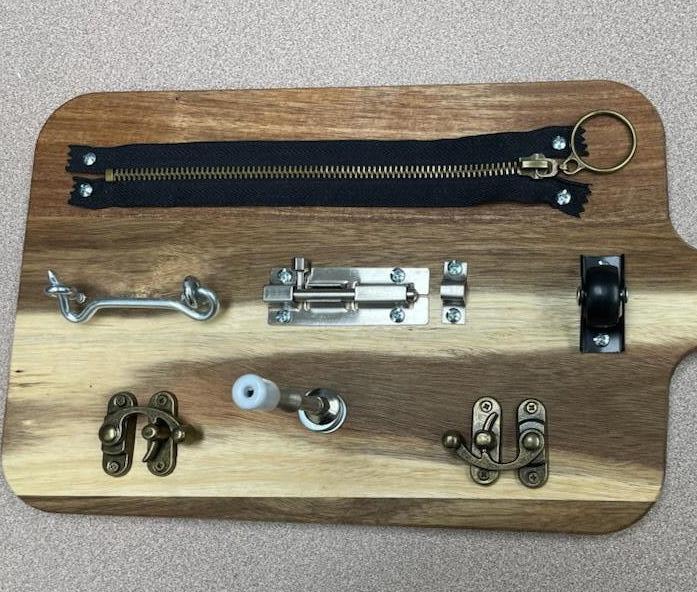
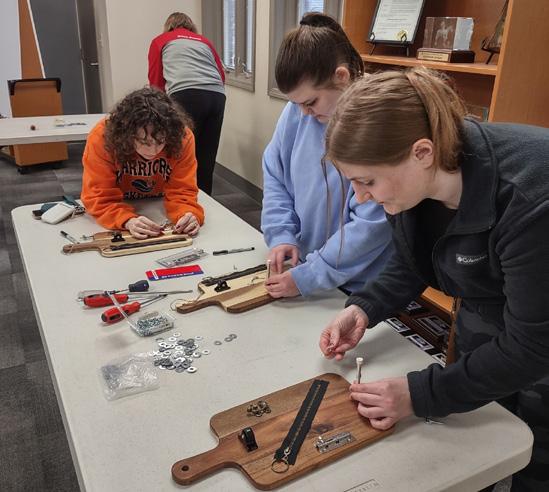
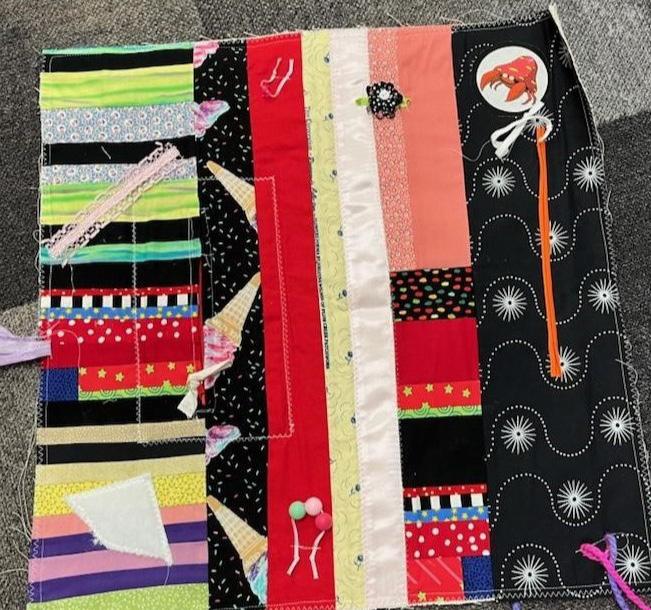
If you are interested in a fidget board or throw, please contact Laura Bray, Volunteer Administrator, at (765) 759-1121 ext. 136 or lbray@lifestreaminc.org.
1701 Pilgrim Blvd.
Yorktown, IN 47396
lifestreaminc.org
(800) 589-1121 | lifestreaminc.org | facebook.com/lifestreamservices
LifeStream’s STEP In Caregiver Programs are a comprehensive way to educate and support family caregivers, care partners, and people with care needs. LifeStream offers Caregiver Memory Kits, support groups, and evidence-based programs to help you STEP In to caregiving. LifeStream Services is also thrilled to provide caregivers and care partners with a resource binder that is an organizational tool used to prepare in the case that someone else may need to step in and provide care— either temporarily or permanently—and to empower caregivers who help with care needs.
Individuals who may need to step in could include another family member, a professional caregiver, a neighbor, or a friend. All of these care partners make up your care team.
Request a Care Team Resource Binder here: lifestreaminc.org/form-stepin-binder-request
